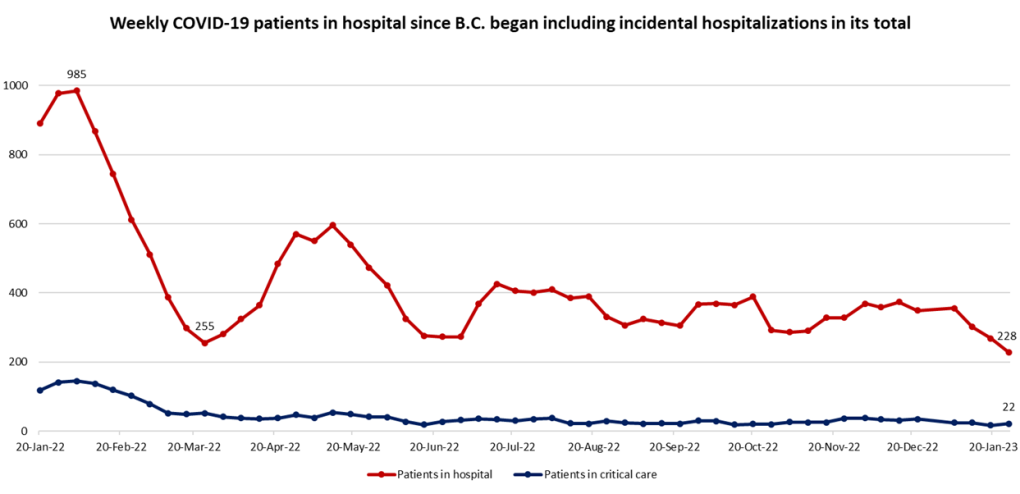Fewer COVID-19 patients in B.C. hospitals today than at any point in 2022
 A sign at the entrance to Surrey Memorial Hospital is seen on Saturday, Feb. 5, 2022. (CTV)
A sign at the entrance to Surrey Memorial Hospital is seen on Saturday, Feb. 5, 2022. (CTV)
The number of people hospitalized with COVID-19 in B.C. has reached its lowest level in more than a year.
The B.C. Centre for Disease Control reported 228 test-positive patients in hospitals across the province as of Thursday. The last time the hospital population was that low was before the BCCDC switched counting methods and began including "incidental" hospitalizations in its weekly total.
 The number of patients in B.C. hospitals with COVID-19 on Thursdays since the province started including incidental cases in its count is shown. (CTV)
The number of patients in B.C. hospitals with COVID-19 on Thursdays since the province started including incidental cases in its count is shown. (CTV)
That switch happened in January 2022. Until this week, the lowest number of patients in hospital on a Thursday since that change had been 255 on March 24, 2022.
"Incidental" COVID-19 hospitalizations are those in which a patient tests positive for the disease after being admitted to hospital for some other reason.
Before January 2022, B.C. reported only hospitalizations in which COVID-19 was believed to be the underlying cause. The last time that count was below 228 was the last day of 2021, when there were 220 patients in hospital under the old counting method.
Health officials have said between 40 and 50 per cent of the patients in hospital with COVID-19 each week are there because of the disease, while the rest are incidental hospitalizations.
OTHER DATA
Thursday's update from the BCCDC also included 408 new lab-confirmed cases of COVID-19 from the week of Jan. 15 to 21, a substantial decrease from the 560 reported the week before and the lowest total reported since the week of Oct. 30 through Nov. 5.
There were also 104 new hospital admissions – a different metric than the currently hospitalized population – during the week of Jan. 15 to 21, down from 142 initially reported during the preceding week.
Both the weekly case count and new hospital admissions are imperfect measures. The former does not include reinfections or at-home rapid antigen tests, while the latter is always revised higher in the following week's report.
Because of the limitations of the weekly case count, experts have estimated that B.C.'s official figures for COVID-19 infections are off by roughly 100-fold.
Still, both cases and new hospital admissions are trending downward, and wastewater surveillance – which was recently expanded to include communities in the Interior and on Vancouver Island – has been pointing in the same direction.
This week's wastewater data has not yet been released, but as of last week's update, every monitored treatment plant in the province was showing decreased concentrations of the coronavirus.
VACCINATION AND 'KRAKEN'
In an update last week, federal health officials said it's unclear whether the XBB.1.5 lineage of SARS-CoV-2 – also known as the "Kraken" variant – will become the dominant strain of COVID-19 in Canada, but it's proportion of the country's total infections has been rising.
Citing this risk, Chief Public Health Officer Dr. Theresa Tam and federal Health Minister Jean-Yves Duclos echoed advice from the National Advisory Committee on Immunization, which continues to urge all Canadians ages five and older to get a booster dose of a bivalent COVID-19 vaccine if they haven't already.
In B.C., 19,291 doses of vaccine were administered during the week that ended Jan. 21.
While 83 per cent of residents of all ages have received at least two doses of a COVID-19 vaccine, significantly fewer have had a booster dose. As of Jan. 22, 56 per cent had had at least three doses, with 32 per cent – mostly those in the older age groups more susceptible to serious illness – had had at least four.
CTVNews.ca Top Stories

BREAKING American millionaire Jonathan Lehrer denied bail after being charged with killing Canadian couple
American millionaire Jonathan Lehrer, one of two men charged in the killings of a Canadian couple in Dominica, has been denied bail.
Grandparent scam suspects had ties to Italian organized crime, Ontario police allege
A group of suspects that allegedly defrauded seniors across Ontario and other parts of Canada using a so-called emergency grandparent scam appear to have ties to 'Italian traditional organized crime,' according to an investigator involved in the OPP-led probe.
Motion to allow keffiyehs at Ontario legislature fails
A motion to reverse a ban on the keffiyeh within Queen’s Park failed to receive unanimous consent Thursday just moments after Ontario Premier Doug Ford reiterated his view that prohibiting the garment in the House is divisive.
Trend Line Anger, pessimism towards federal government reach six-year high: Nanos survey
Most Canadians in March reported feeling angry or pessimistic towards the federal government than at any point in the last six years, according to a survey by Nanos Research.
Allman Brothers Band co-founder and legendary guitarist Dickey Betts dies at 80
Guitar legend Dickey Betts, who co-founded the Allman Brothers Band and wrote their biggest hit, 'Ramblin' Man,' has died. He was 80.
Taylor Swift's new album allegedly 'leaked' on social media and it's causing a frenzy
A Google Drive link allegedly containing 17 tracks that are purportedly from Swift's eagerly awaited "The Tortured Poets Department" album has been making the rounds on the internet in the past day and people are equal parts mad, sad and happy about it.
'Shopaholic' author Sophie Kinsella reveals brain cancer diagnosis
Sophie Kinsella, the best-selling author behind the 'Shopaholic' book series, has revealed that she is receiving treatment for brain cancer.
Lack of detention space could force CBSA to release detainees, internal memo warns
The Canada Border Services Agency is scrambling to find space to hold high-risk detainees that are set to be transferred from provincial jails in June.
What does it mean to be 'house poor' and how can you avoid it?
The journey to home ownership can be exciting, but personal finance columnist Christopher Liew warns about the trappings of becoming 'house poor' -- where an overwhelming portion of your income is devoured by housing costs. Liew offers some practical strategies to maintain better financial health while owning a home.






























